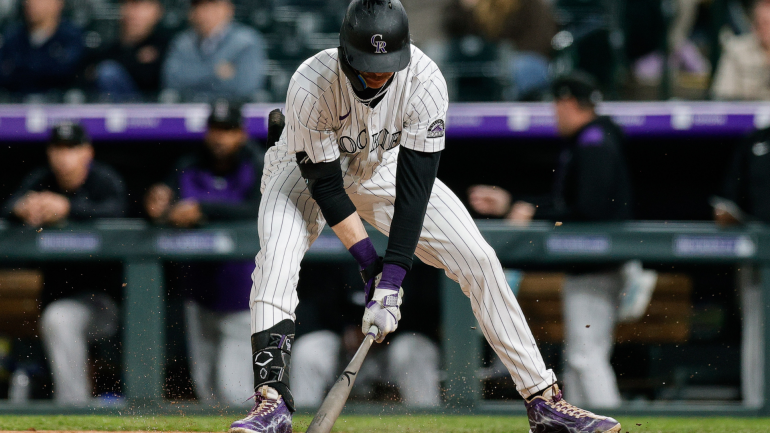

The Colorado Rockies ended April in rare form on Wednesday night, scoring a 2-1 victory over reigning National League Cy Young Award winner Chris Sale and the Atlanta Braves. The Rockies, losers of eight of their last nine and 16 of their last 18, are now 5-25 on the year with a two-game “cushion” on possession of the worst record in all of Major League Baseball.
Predictably, the Rockies find themselves in undesirable company. Earlier this week, they secured the worst start in modern NL history — and, more importantly, one of the worst starts in all MLB history — by becoming one of five clubs to lose at least 25 of their first 30 contests.
We here at CBS Sports figured the beginning of May was an opportune time to take a deeper look at the Rockies’ putrid start. Scroll slowly with us, won’t you, as we break down 10 other notable numbers that illustrate why Colorado is in this undesirable position.
1. 27-135 projected record
We may as well start here. If the Rockies were to continue to play at this pace for the duration of the season, they would finish the year with a 27-135 record. That would represent the worst season in modern MLB history, and by a wide margin at that. For those with short memories: last year’s Chicago White Sox established a new low point in modern MLB history by posting a 41-121 record.
2. On pace for third consecutive 100-loss season
Anyone familiar with the statistical laws that by and large inform how baseball works knows the Rockies are unlikely to continue to play this poorly over their next 132 games. Yet, even with some positive regression, they still have a chance to do damage to the record books. Baseball Prospectus’ PECOTA forecast model has them down for 114 losses, which would represent the most in franchise history. Additionally, it would give them three consecutive 100-loss seasons.
How rare is that? According to CBS Sports’ research team, only 12 clubs have pulled it off in the modern era, and only two have done it since the last round of expansion:
The Rockies appear highly likely to join their ranks.
3. 43.9%
If the Rockies want to avoid that fate, they’ll need to go 58-74 the rest of the way — or, win games at a 43.9% clip. That figure prorates out to 71 wins over a full-length season. While playing like a 71-win club may not seem like asking too much of a team, keep in mind that we’re talking about the Rockies here. They haven’t won 70 or more games in a single season since 2021.
4. Minus-77
This number represents the Rockies’ run differential. That is, again, the worst mark in the majors — to the extent that only one other team (the Miami Marlins) have been outscored by even as many as 50 runs this season. Another way of thinking about this number is that the Rockies have, on average, been outscored by 2.6 runs per game — not per loss, but per game. For comparison’s sake, last year’s White Sox were outscored on average by 1.9 runs per game.
5. 63 wRC+
A big reason for the Rockies’ miserable start? One of (at least to date) the worst offenses in MLB history. We’re not exaggerating here. Colorado’s hitters have generated a 63 wRC+, or FanGraphs’ catch-all offensive measure that adjusts for ballpark. That would represent the lowest figure for any American or National League team since integration (1947). In fact, only one AL/NL team has ever finished below 70: the 1963 New York Mets. There’s plenty of time remaining in the season, and precedent suggests the Rockies won’t become the second. Still, there’s no denying their offense has been on another level through 30 games — and not in a good way.
6. 5.30 staff ERA
More often than not throughout franchise history, it’s been the Rockies pitching staff that has let them down. That’s not the case this year. Don’t get us wrong: Colorado’s arms have performed poorly, too. Their 5.30 staff ERA ranks 28th in baseball, and their 8% K-minus-BB% checks in at 29th. But, on the bright side, those marks are only bad from a seasonal perspective, as opposed to the offense’s greater historical futility.
7. Minus-23 OAA
Not to be outdone, the Rockies’ defense also grades as below average. As with the pitching staff, this is merely bad relative to their peers (they rank 23rd in Statcast’s Outs Above Average) rather than one of the worst units ever. Colorado has received particularly poor fielding from the corner-outfield positions and second base. That second part is notable given that the Rockies non-tendered former Gold Glove Award winner Brendan Rodgers over the offseason.
8. 1 non-reliever with more than 0.5 WAR
It’s probably too early to concern oneself with the All-Star Game, but good luck to the decision makers who have to pick the Rockies’ representative. To date, they have just one non-reliever on their roster to tally at least 0.5 Wins Above Replacement: catcher/DH Hunter Goodman.
Goodman, 25, has been a legitimate bright spot thus far this season. He’s batted .268/.355/.474 (122 OPS+) with five home runs and five doubles. He’s also reduced his strikeout rate. If he can keep it up, he would sure seem to have a real shot at making the midsummer trip to Atlanta.
9. Next 29 games against winning teams
How’s this for a concerning thought: things may get worse in Colorado before they get better. The Rockies will not play a fellow losing club for the entirety of May, or not until they begin a series against the Miami Marlins on June 2. In the interim, the Rockies will play 29 consecutive games versus the San Francisco Giants, Detroit Tigers, San Diego Padres, Texas Rangers, Arizona Diamondbacks, Philadelphia Phillies, New York Yankees, Chicago Cubs, and New York Mets.
10. 16 losses from another milestone
With the Rockies’ tough upcoming slate in mind, let’s conclude this exercise by getting in front of something else: the possibility we’re revisiting them and their historical ineptitude again after they clear the 50-game mark.
If you’re wondering, the Rockies are 16 losses away from cinching the worst 50-game start to a season in modern MLB history. No club has lost more than 40 of their first 50 contests, and only two have lost even that many: the 2023 Athletics and the 1932 Boston Red Sox.
This news was originally published on this post .








Be the first to leave a comment